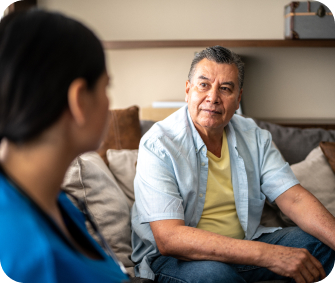
How can my cancer care team help?
Learn how each specialist can help support you along your cancer journey so you can build the right care team for you.
Who is part of my cancer care team?
Your care team may be made up of doctors, nurses, and other specialists who will help you during diagnosis and treatment, as well as when your treatment is finished.
Doctors
You may work with your primary care provider as well as an oncologist (a doctor who specializes in cancer), surgeon, radiation oncologist (a doctor who specializes in radiation), and other doctors. You will work with these doctors in developing your care plan
Nurses
You may work with different types of nurses, including an oncology nurse (a nurse who cares for people living with cancer). You’ll likely spend a lot of time speaking with nurses throughout your journey, so it’s important that you feel comfortable with them
Navigators
Depending on your healthcare system, you may meet with a patient navigator, nurse navigator, financial navigator, or social worker. All of these professionals can help people living with cancer access and find ways to help pay for healthcare
Other specialists
Other specialists may include pharmacists, home health aides, nutritionists, psychiatrists, clergy, and other important professionals
How can I build the right team for me?
Your care team should make sure you are cared for, not only as a cancer patient, but as a whole person. This includes your mental, physical, emotional, and spiritual needs.
That’s why it’s important to advocate to find the right team for you. Your team should make you feel confident, safe, and understood throughout your cancer journey. And it’s okay to speak up or seek multiple opinions if you don’t feel like your needs are supported.
You can also talk to your doctor about a collaborative approach to your care, especially if you are comfortable with your local doctor or live far from a treatment center. Your doctor can help create a plan where both teams work together to support you.
Who can I turn to and when?
Someone on your care team can help no matter what challenge you face, whether it’s related to your treatment or something more personal. Remember, you should always feel empowered to reach out to whoever you feel most comfortable with. If you need help knowing who to reach out to and when, here are a few common challenges you may face and the care team members who can help:
These care team members can all help you better understand your treatment options:
- A primary care provider (the main doctor you visit routinely) or a specialist, like a pulmonologist, urologist, or gynecologist, may be part of conversations early in your diagnosis. They may also refer you to a cancer surgeon or an oncologist
- A cancer surgeon (a doctor who treats cancer using surgery) may help diagnose your cancer, review results with you, and make a plan for removing the cancer. They may suggest that you talk to an oncologist before or after surgery, and if not, you can ask to talk to one
- An oncologist (a doctor who specializes in treating cancer) may help diagnose your cancer and oversee your care. They can also help decide appropriate treatment options for you, such as treatment before or after surgery
- A radiation oncologist (a doctor who specializes in radiation) may help provide information about treating cancer using radiation and other medical imaging techniques
- A pathologist (a professional who identifies diseases by studying tissues and cells) may work with members of your care team to identify the type and stage of your cancer, interpret biomarker testing, and help determine your treatment options
It’s important to have a well-rounded cancer care team that works together. Talk to your care team about making sure you have the right doctors behind you.

Your oncologist or primary care doctor can refer you to other specialists, including surgical oncologists (surgeons who perform surgery to help treat cancer).
In addition, the below professionals can offer language support, translation, or help with other communication barriers:
- Oncology nurse (a nurse who specializes in cancer care)
- Oncologist social worker (a professional who helps those living with cancer access practical resources)
- Patient navigator (a healthcare professional who can help navigate any concerns related to your cancer care)
Healthcare professionals can help you cope with anxiety and other mental health or emotional concerns as you go through cancer diagnosis and treatment.
- Psychologist
- Therapist
- Psychiatrist
- Counselor
- Patient navigator
- Oncology social worker
If you are looking for mental health services, there are tools available to help. If you have insurance, visit your insurer’s website and use their “find a doctor” tool to locate a doctor that is in your network and accepts your insurance. If you don’t have insurance, visit healthcare.gov to search for a local community health center.


If you have concerns about paying for cancer treatment, first talk with either your oncology nurse or your patient navigator. They may be able to answer some of your questions about managing the cost of cancer.
If they do not have the answer, they will be able to help you find someone who may, such as an oncology social worker or pharmacist.
An oncology nurse or patient navigator can help with questions you may still have or can connect you with someone who can help.
If you’ve already left the office, you can always call the doctor’s office or ask questions using your patient portal. If you’re unsure how to log into your portal, contact a care team member for help.

Where can I find more cancer support?
Access resources that may help you during cancer treatment, including how to find financial support, local childcare, transportation services, and other important resources.
US-KEY-08158 09/24




